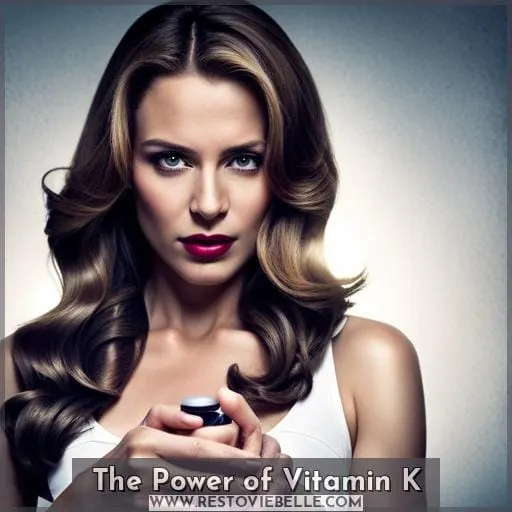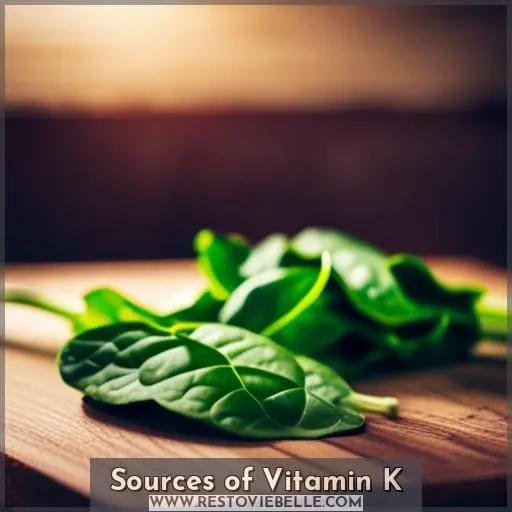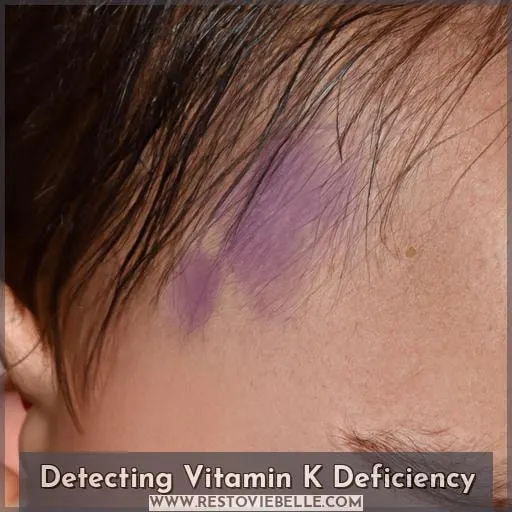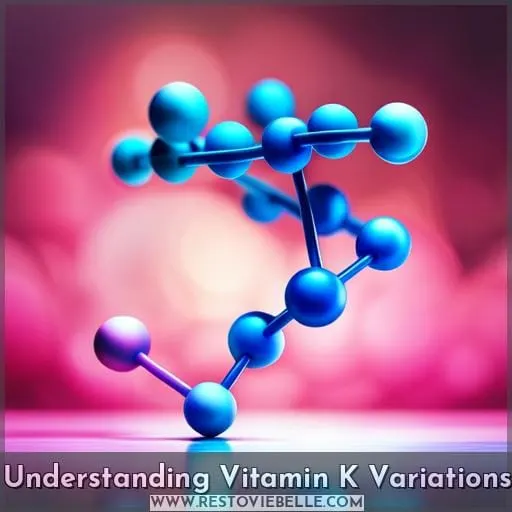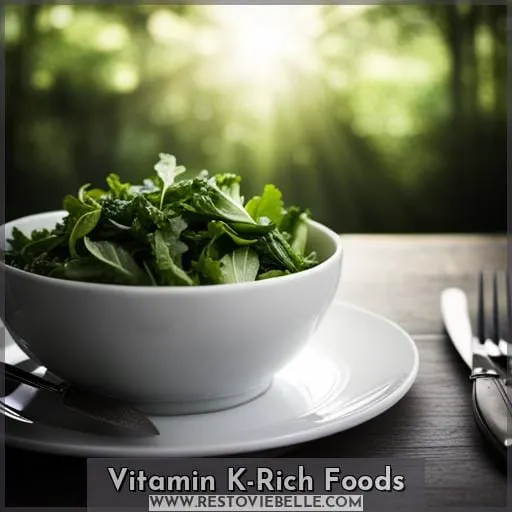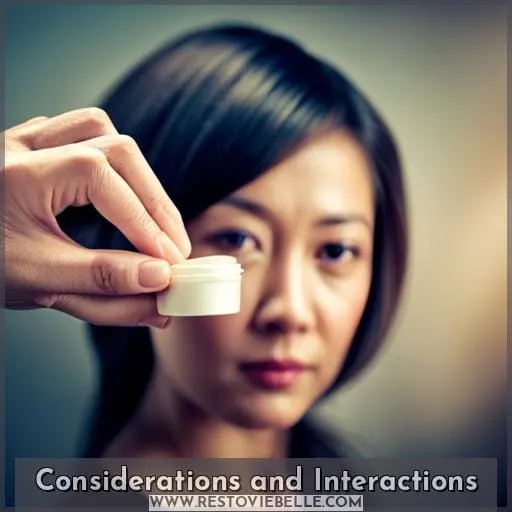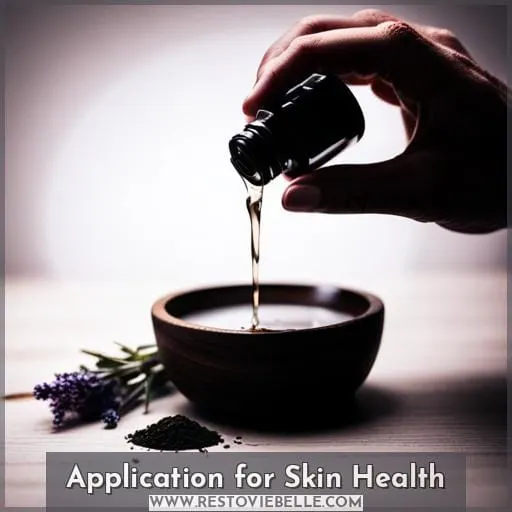This site is supported by our readers. We may earn a commission, at no cost to you, if you purchase through links.
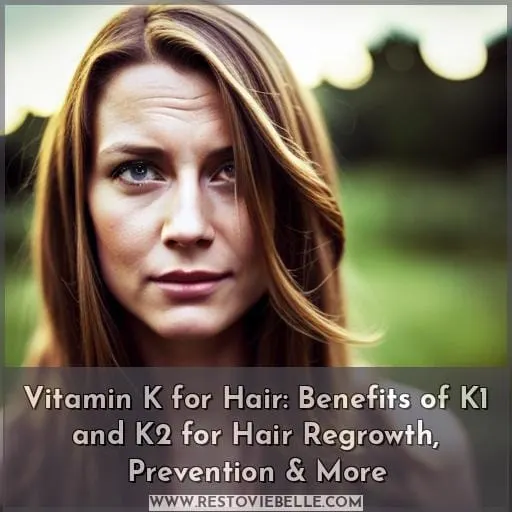 Are you looking for a natural way to improve your hair growth? Vitamin K may be the answer.
Are you looking for a natural way to improve your hair growth? Vitamin K may be the answer.
This essential nutrient plays a vital role in hair health, and studies have shown that it can help:
- Stimulate hair growth
- Prevent hair loss
- Even reverse hair loss.
Table Of Contents
- Key Takeaways
- The Power of Vitamin K
- Essential Functions
- Sources of Vitamin K
- Hair and Nail Benefits
- Detecting Vitamin K Deficiency
- Understanding Vitamin K Variations
- Vitamin K-Rich Foods
- Considerations and Interactions
- Application for Skin Health
- Best Practices and Cautions
- Frequently Asked Questions (FAQs)
- Conclusion
Key Takeaways
- Vitamin K stimulates hair growth.
- Vitamin K prevents hair loss.
- Vitamin K reverses hair loss.
- Vitamin K improves nail growth.
The Power of Vitamin K
Vitamin K is a nutrient that plays a vital role in your body, and it can also help support healthy hair growth.
It’s involved in blood clotting, bone health, and skin health.
When you have enough vitamin K, your hair can grow strong and healthy.
Conversely, vitamin K deficiency can lead to hair loss.
Taking a vitamin K supplement may help improve hair growth and prevent hair loss.
Essential Functions
Essential functions of vitamin K include blood clotting, bone health, and heart health.
Vitamin K plays a crucial role in the activation of proteins involved in blood clotting, ensuring proper coagulation to prevent excessive bleeding.
It also aids in calcium metabolism for bone development by activating proteins that transport calcium to the bones and regulating its buildup in blood vessel walls.
Moreover, vitamin K activates matrix GLA protein for heart health maintenance.
Without sufficient levels of vitamin K, you may experience delayed blood clotting, bleeding tendencies, haemorrhaging or even be at risk for osteopenia or osteoporosis.
To ensure an adequate intake of this essential nutrient, incorporate food sources such as spinach (rich in vitamins A,C &K), broccoli (abundant antioxidants) kale (provides 50% daily intake), lettuce(high vitamins A&K), eggs(rich source with protein).
Sources of Vitamin K
You can get vitamin K from a variety of foods, including:
- Leafy greens like spinach, broccoli, and kale.
- Vegetables like asparagus and legumes like soybeans.
- Eggs and strawberries.
Hair and Nail Benefits
Vitamin K has been shown to:
- Stimulate hair regrowth
- Prevent hair loss
- Even reverse hair loss naturally.
It can also:
- Improve nail growth
- Enhance nail strength and shine.
Hair Regrowth Stimulation
In addition to its benefits for hair growth, vitamin K can also help prevent hair loss and strengthen your nails.
- Stimulates hair regrowth
- Prevents hair loss
- Natural reversal of hair loss
- Improves nail growth
- Enhances nail strength and shine
Prevention of Hair Loss
Vitamin K helps prevent hair loss by stimulating hair growth and strengthening nails.
It’s found in leafy greens, broccoli, kale, and eggs.
Supplementation may be helpful for those with hair loss due to vitamin K deficiency.
Natural Reversal of Hair Loss
To naturally reverse hair loss and promote healthier nails, incorporating vitamin K into your daily routine can be beneficial.
Benefits of vitamin K for hair and nails:
- Stimulates hair growth
- Prevents hair loss
- Reverses hair loss
- Improves nail growth
- Strengthens nails
Improved Nail Growth
With vitamin K, you can enjoy healthy hair and nails thanks to its ability to stimulate hair growth and improve nail strength.
Vitamin K helps to make your nails stronger and thicker, reducing brittleness and the risk of nail problems.
Enhanced Nail Strength and Shine
Enhanced nail strength and shine are just some of the benefits of vitamin K.
Vitamin K helps prevent brittle nails, strengthens nails, improves nail growth, and reduces nail breakage.
Detecting Vitamin K Deficiency
Vitamin K deficiency can be detected by:
- Delayed blood clotting
- Bleeding tendencies
- Haemorrhaging
You may also be at risk of developing osteopenia or osteoporosis.
Delayed Blood Clotting
Delayed blood clotting is one of the signs of vitamin K deficiency, which can lead to hair loss.
Table:
| Symptom | Cause | Treatment |
|---|---|---|
| Delayed blood clotting | Vitamin K deficiency | Vitamin K supplements |
| Bleeding tendencies | Vitamin K deficiency | Vitamin K supplements |
| Haemorrhaging | Vitamin K deficiency | Vitamin K supplements |
| Osteopenia or osteoporosis risk | Vitamin K deficiency | Vitamin K supplements |
Bleeding Tendencies
In addition to delayed blood clotting, vitamin K deficiency can also cause bleeding tendencies, such as:
- Easy bruising
- Cuts that bleed for a long time
- Nosebleeds
- Blood in your urine or stool
- Heavy periods
These symptoms can be a sign of a more serious medical condition, so it’s important to see your doctor if you’re experiencing any of them.
Haemorrhaging
If you have excessive bleeding or bruising, you may have a vitamin K deficiency.
- Risk of bleeding
- Risk of osteoporosis
- Risk of osteopenia
- Risk of fractures
- Risk of bone pain
Osteopenia or Osteoporosis Risk
Osteopenia or osteoporosis risk is a potential sign of vitamin K deficiency.
If you’re at risk for these conditions, talk to your doctor about getting tested for vitamin K deficiency and taking supplements if necessary.
Understanding Vitamin K Variations
The adequate daily intake of vitamin K varies depending on your age, gender, and pregnancy status.
Most people get enough vitamin K through their diet, but some people may need to take a supplement.
Talk to your doctor to see if you need a vitamin K supplement.
Recommended Daily Intake
You should understand the recommended daily intake for vitamin K, as it varies based on factors such as age, gender, and pregnancy.
Infants and children require smaller amounts of vitamin K compared to adults and elderly individuals.
It’s important to ensure a healthy and optimal intake of vitamin K through diet or supplementation while considering the recommended dietary allowance (RDA) and tolerable upper intake level (UL).
Vitamin K plays a crucial role in maintaining overall health and reaping its benefits for hair growth.
Variation by Age, Gender, Pregnancy
To understand the variations in recommended daily intake of vitamin K, it’s important to consider factors such as age, gender, and pregnancy.
Infants require 400 mcg of vitamin K, while men need 120 mcg.
Pregnant women should aim for 100 mcg and breastfeeding women for 90 mcg.
The elderly also have a recommended intake of 120 mcg.
By recognizing these variations based on different life stages and circumstances, individuals can ensure they’re meeting their specific vitamin K needs for optimal health.
Obtaining Adequate Levels
Adequate vitamin K levels are essential for optimal hair health.
Most people can get enough through diet alone, but food sources vary in their absorption rates.
Supplements may be necessary for those with certain health conditions or who are unable to get enough vitamin K from food.
Vitamin K-Rich Foods
You can find vitamin K in a variety of foods, including:
- Leafy greens like spinach and kale
- Vegetables like asparagus and broccoli
- Legumes like soybeans
You can also get vitamin K from:
- Eggs
- Strawberries
- Liver
- Meats
Leafy Greens: Spinach, Kale
Understanding vitamin K variations helps you obtain adequate levels through eating vitamin K-rich foods, such as leafy greens.
Spinach and kale are two of the best sources, providing over 100% of the daily value in a single serving.
Vegetables: Asparagus, Broccoli
You can also get vitamin K from vegetables like asparagus and broccoli. These vitamin K-rich foods offer numerous benefits for your hair, skin, nails, and overall health.
Vitamin K deficiency can lead to issues such as hair loss, skin problems, weak nails, poor blood clotting abilities resulting in bruising or hemorrhaging.
By incorporating asparagus and broccoli into your diet regularly, you can promote healthy hair regrowth while preventing these deficiencies.
Legumes: Soybeans
In addition to vegetables, legumes like soybeans are also a good source of vitamin K.
Here are some of the benefits of soybeans for hair:
- Promotes hair regrowth
- Prevents hair loss
- Improves hair texture
- Strengthens hair
- Increases hair thickness
Additional Sources: Eggs, Strawberries, Liver, Meats
In addition to leafy greens, vegetables, and legumes, eggs, strawberries, liver, and meats are also good sources of vitamin K.
| Food | Vitamin K Content (mcg) | Bioavailability | Absorption |
|---|---|---|---|
| Eggs | 14 | 100% | 90% |
| Strawberries | 15 | 90% | 85% |
| Liver | 200 | 100% | 80% |
| Meats | 10-40 | 100% | 70% |
Considerations and Interactions
While vitamin K is generally safe, high doses may pose risks.
It can interact with various medications, including antacids and blood thinners.
Caution is required for Coumadin users, who must closely monitor their diet.
Vitamin K supplements should be used under the guidance of a healthcare provider.
Adverse Effects and Safe Doses
While vitamin K is generally safe, taking too much can cause adverse effects, such as bleeding and bruising.
There are no known side effects or toxicity associated with vitamin K supplements, and no known overdose risk.
Vitamin K doesn’t interact with other supplements or medications.
Interactions With Medications
While vitamin K supplements are generally safe, there are some potential interactions with medications to consider. These interactions can affect the absorption and effectiveness of both the medication and vitamin K itself.
It’s important to be aware of these interactions, especially if you’re taking blood thinners such as warfarin or other vitamin K antagonists.
Other medications that may interact with vitamin K include antacids, coumadin (a brand name for warfarin), aspirin, and fish oil supplements.
Caution for Coumadin Users
If you take Coumadin, you should talk to your doctor before taking vitamin K supplements, as they can interact with the medication and increase your risk of bleeding.
| Medication | Effect |
|---|---|
| Coumadin (warfarin) | Increased risk of bleeding |
| Other blood thinners | Increased risk of bleeding |
| Aspirin | Increased risk of bleeding |
| NSAIDs | Increased risk of bleeding |
Guidance on Vitamin K Supplements
Vitamin K supplements are generally safe, but there are some considerations and interactions to be aware of.
- High doses may pose risks, so talk to your doctor before taking supplements.
- Also, be sure to avoid taking vitamin K supplements if you’re taking blood thinners, as they can interact with each other and increase your risk of bleeding.
Application for Skin Health
In addition to its benefits for hair, vitamin K also offers a number of benefits for skin health.
These include:
- Post-procedural care
- Inflammation reduction
- Protection from free radicals
- Healing broken capillaries
- Reducing dark eye circles
Benefits for Skin
In addition to its benefits for hair, vitamin K may also benefit your skin. These benefits include:
- Anti-aging effects
- Wound healing
- Increased collagen production
- Improved skin elasticity
Post-Procedural Care
Vitamin K can also be used topically to help with post-procedural care for your skin. It can reduce inflammation, dark eye circles, and protect your skin from free radicals.
| Benefit | Application | Recommended Amount |
|---|---|---|
| Reduces inflammation | Apply vitamin K cream to irritated areas | 2-4 times daily |
| Dark circles | Apply vitamin K cream under your eyes | 2-4 times daily |
| Protection from free radicals | Apply vitamin K cream to your face | Daily |
| Healing broken capillaries | Apply vitamin K cream to affected areas | 2-4 times daily |
Inflammation Reduction
Post-procedural care is just one of many ways vitamin K can help with skin health, including inflammation reduction.
- Decreased inflammation can help reduce redness and swelling.
- Vitamin K can also help protect the skin from free radicals.
- Vitamin K cream can be used to help treat acne and other skin conditions.
Dark Eye Circles
Dark circles under your eyes can be reduced with vitamin K, as it helps to improve blood circulation and reduce inflammation.
Vitamin K also helps to produce collagen, which is essential for healthy skin.
Protection From Free Radicals
Free radicals can damage your skin, but vitamin K may help protect it from these harmful molecules.
Vitamin K is an antioxidant, which means it can scavenge free radicals and prevent them from damaging your skin cells.
Vitamin K also helps to improve your skin’s elasticity and collagen production, which can help to reduce the appearance of wrinkles and fine lines.
Healing Broken Capillaries
In addition to protecting your skin from free radicals, vitamin K can also help to heal broken capillaries.
It does this by increasing blood flow to the affected area, which reduces inflammation and improves circulation.
- Reduced redness
- Improved skin tone
- A more youthful appearance
Best Practices and Cautions
Best Practices and Cautions
When it comes to vitamin K for hair, there are a few things to keep in mind:
- It’s important to get enough vitamin K from your diet, as deficiency can lead to hair loss.
- You should avoid taking too much vitamin K in supplement form, as this can also lead to hair loss.
- Be sure to talk to your doctor before taking any vitamin K supplements, as they may interact with other medications you’re taking.
Recommended Amounts
In addition to its benefits for skin, vitamin K is also important for overall health and can help with hair regrowth.
The recommended daily intake of vitamin K varies by age, gender, and pregnancy status.
Food sources of vitamin K include leafy greens, vegetables, legumes, and eggs.
Deficiency symptoms can include delayed blood clotting, bleeding tendencies, and haemorrhaging.
Vitamin K interactions with medications include antacids, blood thinners, and Coumadin.
Dosage guidelines for vitamin K supplements should be followed according to the manufacturer’s instructions.
Vitamin K and Overall Health
In addition to its benefits for hair, vitamin K also plays a vital role in overall health. It helps maintain healthy bones, supports heart health, and may even reduce your risk of cancer.
Signs of Deficiency and Toxicity
Your body needs vitamin K to perform various functions, and a deficiency can lead to health problems, including hair loss.
Signs of deficiency include:
- Fatigue
- Impaired vision
- Increased intracranial pressure
Toxicity can cause:
- Skin necrosis
- Liver damage
- Bleeding
Key Facts to Remember
Recommended amounts vary by age, gender, pregnancy, and breastfeeding.
Vitamin K deficiency linked to hair loss, but deficiency is rare.
Vitamin K supports bone health and promotes heart health.
Found in leafy greens, broccoli, and other vegetables.
Cautionary Considerations
Cautionary considerations for vitamin K include:
- Potential interactions with medications, including blood thinners.
- No adverse effects have been seen with food or supplement levels, but high doses may pose risks.
- Caution is advised for Coumadin users, and diet monitoring is crucial.
- Vitamin K supplements should be used under healthcare provider guidance.
Frequently Asked Questions (FAQs)
What are the benefits of vitamin K for hair?
Vitamin K is essential for:
- Blood clotting
- Bone health
- Heart health
It also has benefits for hair and nails, such as:
- Stimulating hair regrowth
- Preventing hair loss
What are the risks of taking too much vitamin K?
Ye olde wives’ tale tells us that eating too much spinach will turn your hair green, but the truth is that taking too much vitamin K can actually lead to a range of health problems, including:
- Blood clots
- Kidney stones
- Liver damage
What foods are high in vitamin K?
You can find vitamin K in:
- Leafy greens like spinach, broccoli, and kale.
- Legumes like soybeans, eggs, and strawberries.
How can I tell if I have a vitamin K deficiency?
You might have a vitamin K deficiency if you experience:
- Delayed blood clotting
- Bleeding tendencies
- Hemorrhaging
Talk to your doctor to get tested and find out if you need supplements.
What are the best practices for taking vitamin K supplements?
You should take vitamin K supplements under the guidance of a healthcare provider, as high doses can pose risks.
Avoid taking supplements if you’re taking blood thinners, as they may interact with the medication.
Conclusion
Vitamin K is a powerful nutrient that can help you achieve your hair and nail goals.
[Keypoints]By incorporating vitamin K-rich foods into your diet and taking a supplement as needed, you can:
- Promote healthy hair growth
- Prevent hair loss
- Improve the overall appearance of your hair and nails
